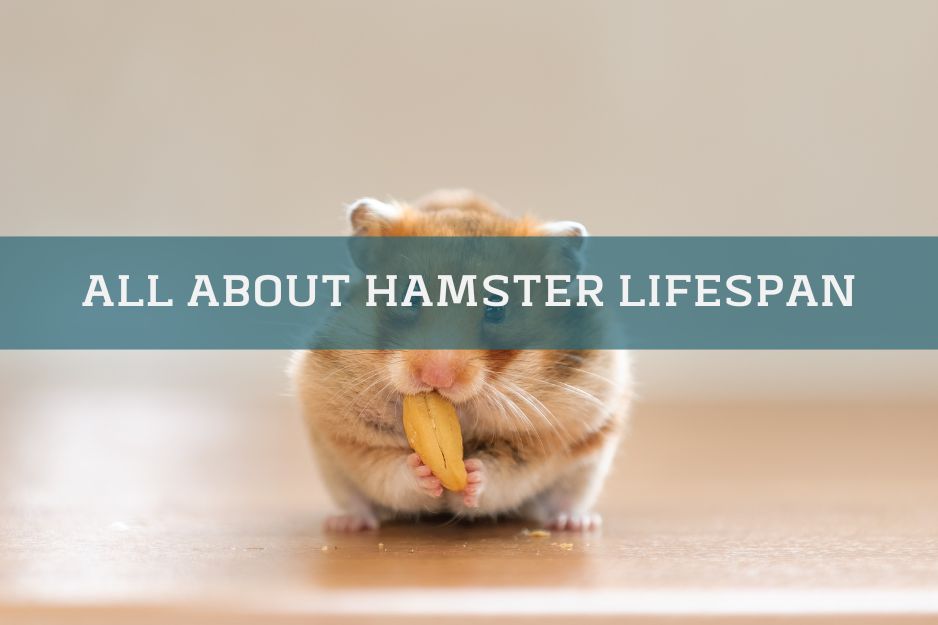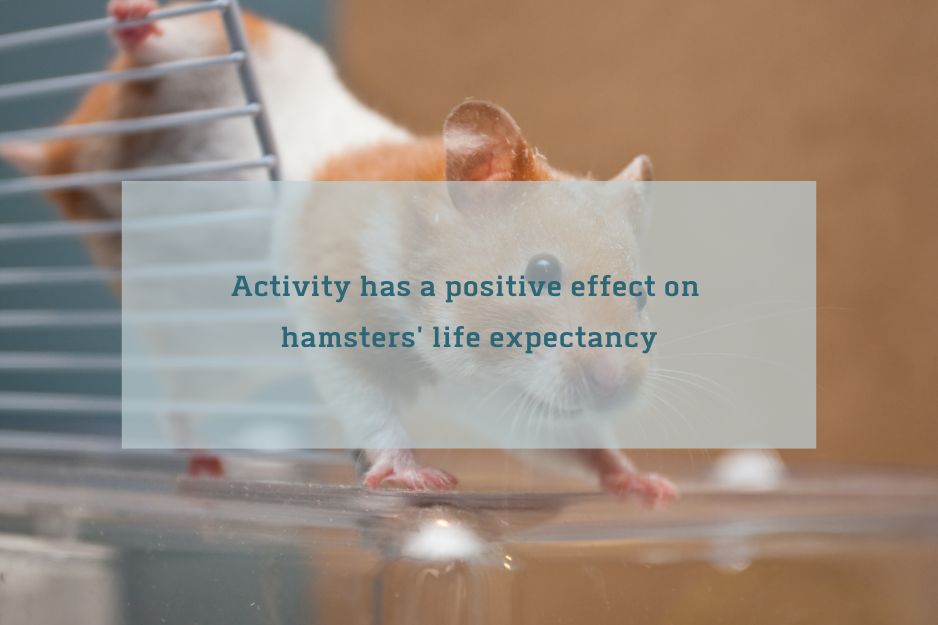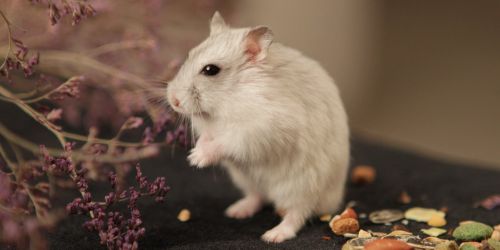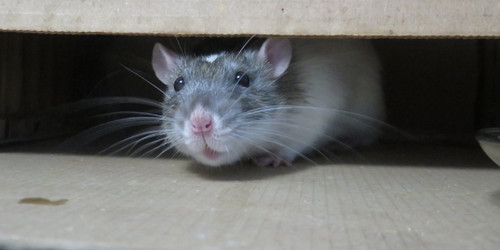Some of the links on our website are affiliate. By making a purchace via our links, you help us create new content and support animal shelters and funds
Hamster's lifespan

Hamsters kept as pets have a lifespan of two to three years, while wild hamsters' typical life expectancy is as little as 12 months.
Although there are numerous breeds of hamsters, their lifespan generally remains very similar. So whether you have a Roborovski Dwarf Hamster or a Syrian Hamster, you can expect each to live approximately the same two to three years.
Here are the 4 most popular pet hamster breeds and their life expectancy:
| Hamster breed | Hamster lifespan |
|---|---|
| Roborovski hamster | 3-3.5 years |
| Syrian hamster | 2-3 years |
| Whinter white dwarf hamster | 16 months - 2 years |
| Chinese hamster | 2-3 years |
What affects a hamster's life expectancy?
Let have a look at the main factors that play a role in a hamster's life expectancybreed
The breed of a hamster can affect how long they live. Just like different dog breeds have different health risks, hamster breeds can also have variations in their health.
Some breeds may have genetic issues that can shorten their lifespan, while others may be healthier overall and live longer.
diet
What a hamster eats really matters for their lifespan. Just like us, they need a balanced and nutritious diet to stay healthy. If they don't get the right nutrients, they can have problems like a weak immune system, obesity, or dental issues, which can all cut their lifespan short.
So, feeding them a good mix of quality hamster food, fresh veggies, and occasional treats is important for their long and healthy life.
living conditions
Where a hamster lives can impact how long they live. Imagine living in a small, dirty, or uncomfortable space – it wouldn't be good for your health, right? It's the same for hamsters. If their cage is too small, dirty, or lacks proper ventilation, it can lead to health issues that shorten their lifespan.
So, making sure they have enough space, a clean environment, and good airflow is vital for their well-being and longer life.
stress
Stress isn't good for anyone, including hamsters. When they're constantly stressed, it can weaken their immune system, make them more prone to getting sick, and reduce their overall happiness. Things like overcrowding, loud noises, or constant disturbances can stress them out.
So, providing them with a calm and secure environment with plenty of hiding spots helps keep them relaxed and can contribute to a longer lifespan.
genetics
Just like some things run in families, genetics can influence how long a hamster lives. Some hamsters might inherit genes that make them more susceptible to certain health problems, while others might have a stronger genetic background that helps them live longer and healthier lives.
Genetics play a part in their overall health and resilience, which impacts their lifespan.
care
The way we take care of our hamsters has a big impact on their lifespan. Giving them the right environment, food, regular vet check-ups, and love and attention all contribute to their well-being and longevity.
Keeping an eye on their health, getting them help when they're sick or injured, and providing a nurturing and happy environment helps ensure they have a longer and healthier life.
There are factors that are out of your control, like genetics or breed. As you've already seen, certain hamster species have a longer lifespan than others. Also, hamsters are prone to different illnesses, and that also depends on the breed.
But as for other things on the list, it's your responsibility to make sure your hamster gets the best care possible. From spacious clean cage and proper foods to entertainment and visits to the vet, there are ways to help your hamster live a happy and long life.
How to increase a hamster's life expectancy?

There are several ways to increase the lifespan of your hamster:
1. get your hamster from a responsible breeder
In general, hamsters that come from healthy and well-cared-for breeding lines are more likely to live longer than hamsters from unhealthy or poorly bred lines.
So it's important to find a breeder who genuinely cares about the well-being of their hamsters. A good breeder will prioritize the health and happiness of their animals above all else. So, how can you spot a responsible breeder?
Start by researching and gathering recommendations from other hamster owners or local pet communities. Word-of-mouth can often lead you to reputable breeders who have a positive reputation.
When you find a potential breeder, take the time to visit their facility or home where the hamsters are kept. Pay attention to the overall cleanliness and condition of the environment. It should be well-maintained and provide enough space for the hamsters to live comfortably.
Observe how the breeder interacts with the hamsters. A responsible breeder will handle them with care and knowledge, showing a genuine understanding of their needs. They will likely be happy to answer your questions and provide you with information about the hamsters' lineage, health history, and care requirements.
Ask the breeder about their breeding practices. Responsible breeders will have a selective breeding program aimed at improving the breed's overall health and temperament. They will carefully choose breeding pairs based on genetic traits and will be knowledgeable about any potential genetic issues in the breed.
A good breeder will provide proper socialization for the hamsters from an early age. This means the hamsters should be well-handled and exposed to different stimuli, making them more comfortable and adaptable as pets.
Responsible breeders will also offer after-sales support and guidance. They will be willing to assist you with any questions or concerns you may have after bringing the hamster home. They may even have a policy that allows you to return the hamster if you encounter unexpected difficulties.
Lastly, trust your gut feeling. If something feels off or if you have any doubts about the breeder, it's better to look elsewhere. You want to ensure you're getting a hamster from someone who genuinely cares about their well-being and has their best interests at heart.
By considering these factors and finding a responsible breeder, you'll have a better chance of bringing home a healthy and well-cared-for Roborovski hamster that will make a wonderful addition to your family.
2. choose your hamster carefully
No matter where you get your hamster, these are the specific checks you should make:
- Make sure the hamster is active and curious, but not overly fearful. You don't want it running away as soon as you approach.
- Check its coat. It should be smooth, shiny, and clean. No dry patches, red spots, or excessive shedding.
- Look at its eyes. They should be clear, bright, and fully open. No discharge or signs of infection.
- Check its breathing and overall respiratory health. It shouldn't be coughing, sneezing, or have any nasal discharge. Its whiskers should be clean, and there should be no signs of ticks or parasites.
- Pay attention to its digestion. No signs of diarrhea or dried blood around the anal region. Also, no droppings stuck to its backside or hind legs.
- Take a look at its teeth. They should be of normal size, not curved or broken, and have a color between yellow and orange. White teeth can indicate poor nutrition.
- Make sure the hamster is not showing signs of stress. It should be calm, confident, and curious. Avoid hamsters that bite the cage bars, excessively hide, or show repetitive behaviors.
Choose a proper hamster cage and enrichments
When choosing a cage for your hamster, opt for one that offers the right size and features. Look for a spacious cage that has plenty of space for your hamster to move around, play, and exercise. Wire cages with a solid plastic base or glass aquariums make safer choices.
Check the bar spacing - it has to prevent your hamster from escaping or getting stuck.
For the cage bedding, avoid cedar or pine shavings as they can be harmful to your hamster's respiratory system. Choose safe bedding options like aspen shavings or paper-based bedding, which are non-toxic and comfortable for your hamster.
To make the cage more engaging, include safe and enriching toys:
- a hamster wheel with a solid surface for exercise
- tunnels and hideouts,
- and chew toys made specifically for hamsters.
These items provide mental stimulation, opportunities for exploration, and promote natural behaviors.
Ensure the cage is set up in a safe location, away from direct sunlight, drafts, and extreme temperatures. Keep the cage clean and regularly check for any hazards or damaged items that could harm your hamster, such as sharp edges or chewed toys.
The right cage and enriching environment contribute to your hamster's well-being and longevity.
Provide plenty of space for your hamster
Space is important for a hamster's physical and mental well-being. Make sure their cage is spacious enough for them to move around comfortably. A larger cage allows for more exercise, exploration, and natural behaviors.
Include different levels, platforms, and tunnels to provide an interesting and stimulating environment. Adding exercise wheels, tunnels, and toys that encourage activity can also help keep your hamster physically fit. Remember, a hamster that gets plenty of exercise is likely to have better overall health and potentially live longer.
Keep your hamster on a proper diet
Feeding your hamster a healthy diet is very important! It's all about balance and giving them the right mix of foods.
Start with commercial hamster food that you can find at pet stores. Look for a good brand that has a mix of grains, seeds, and veggies. This is specially made for hamsters and has all the nutrients they need.
Fresh fruits and veggies are also great for your hamster. You can give them small pieces of apple, carrot, cucumber, or broccoli. It adds vitamins, minerals, and fiber to their diet.
Treats are fun, but remember to keep them in moderation. You can give them small bits of plain cooked chicken, mealworms, or special hamster yogurt drops. But don't go overboard with sugary or fatty treats.
And of course, always have fresh water available for your hamster. Use a water bottle attached to their cage to keep it clean and easy for them to drink.
Keep an eye on their weight too. If your hamster starts getting chunky, cut back on the treats and keep an eye on portion sizes.
Remember, a good diet keeps your hamster healthy and happy.
avoid stressors
To minimize stress, create a calm and peaceful environment for your hamster. Keep their cage in a quiet area away from loud noises and disturbances. Provide hiding spots, tunnels, and toys that offer security and enrichment. Handling your hamster gently and avoiding sudden movements can also help reduce stress.
Remember, a happy and relaxed hamster is more likely to live a longer life.
check your hamster's health regularly
Taking care of your hamster involves more than just feeding and providing a cozy home. Regular veterinary care is essential for keeping them healthy. It's a good idea to schedule a check-up with a small animal veterinarian at least once a year. They can assess your hamster's overall health and provide any necessary vaccinations or treatments.
But, of course, there are times when you should visit the vet even if it's not the regular check-up time. Here are some signs that indicate your hamster may need veterinary attention:
- Changes in appetite or weight: If your hamster suddenly loses or gains a significant amount of weight or shows a sudden loss of appetite, it's a sign that something might be wrong.
- Abnormal behavior: If your hamster becomes unusually lethargic, shows signs of distress or pain, or has difficulty moving, it's best to consult a vet. Any sudden changes in behavior could indicate an underlying health issue.
- Breathing difficulties: Difficulty breathing, wheezing, or any unusual noises coming from your hamster's respiratory system may indicate a respiratory infection or other respiratory problem.
- Skin or coat issues: If you notice hair loss, bald patches, redness, swelling, or any unusual lumps or bumps on your hamster's skin, it's important to have them checked by a vet.
- Diarrhea or changes in droppings: Diarrhea or changes in the color, consistency, or frequency of droppings can be a sign of digestive problems or an underlying health issue.
- Eye or nose discharge: Excessive discharge from the eyes or nose, along with any signs of redness, swelling, or discomfort, may indicate an infection or other problem.
- Dental problems: If you notice your hamster having difficulty eating, drooling excessively, or showing signs of dental pain, it's crucial to have their teeth checked by a vet.
Remember, if you notice any of these signs or if something just doesn't seem right with your hamster, don't hesitate to reach out to a veterinarian who specializes in small animals. They will be able to provide the best care and advice to help your furry friend
FAQ
what is pet hamster lifespan?
A pet hamster lifespan is typically two to three years. But there are cases when domesticated hamsters lived longer than that.
how long do hamsters live in the wild?
In the wild, hamsters live up to 12 months. Such short hamster life expectancy in the wild is due to natural predators cutting their lives earlier.
why is hamster lifespan so short?
Hamster lifespan is so short, because, like most other small mammals, they have higher metabolic rates. Also, domesticated hamsters are prone to different illnesses, which shorten their life expectancy.
can hamsters live for 5 years?
Hamsters usually live 2-3 years, although some owners say that their pets have lived longer than that. But while a healthy hamster can live for up to 4 years, there's very little to no chance for it to live five years or longer.
are hamsters hard to keep alive?
Hamsters are not hard to keep alive. As long as you provide careful and gentle handling, proper living conditions, and recommended food - keeping your hamster alive is easy.
do female hamsters live longer?
Some research done on Syrian hamsters hvae shown that males tend to live longer than female hamsters.





